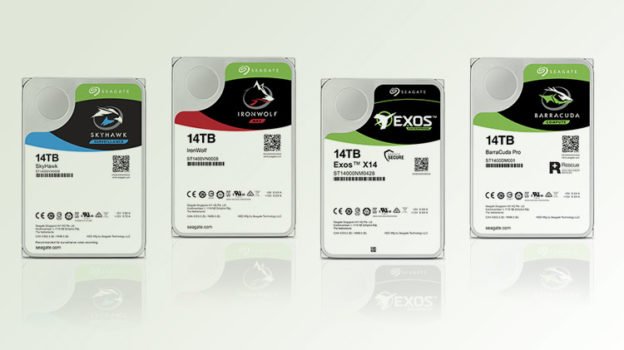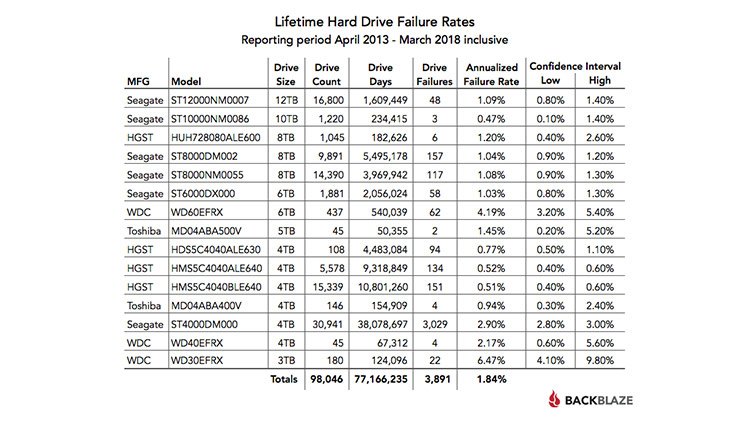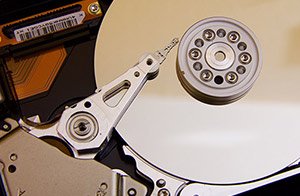
Seagate, as you may know, is one of the leaders in the world of hard drive technology. The company was founded in 1978 and two years later had developed the first 5.25-inch hard disk drive. The 5-megabyte HDD was named the ST-506. In fact, Seagate was a major supplier of these components in the microcomputer industry throughout the 1980s. Seagate, and competitor Western Digital, currently dominate the market. Seagate got to this place simply by swallowing up the competition. Imprimis, Conner Peripherals, Maxtor and Samsung HDD divisions have all become Seagate properties.
Seagate has recently introduced a family of new high capacity disks. Known as IronWolf®, IronWolf® Pro, BarraCuda® Pro, SkyHawkTM and ExosTM X14, these are enterprise level hard drives.
In fact, all of these new products, with the exception of the Barracuda family, are enterprise level disks that were designed and developed to be used in corporate or data center level environments. As a result, they are going to cost slightly more than your average consumer-grade hard drive.
Each disk is made to more or less fall into accordance with the application they will be used with. As an example, the SkyHawkTM drives are intended for use with 24×7 workloads with drives that have been designed for Digital Video Recording environments and NVR systems.
This particular HDD comes complete with Maintain Drive Health software and a two-year data recovery plan – in case something happens to the drive and there’s a problem. I’m not all that sure about the details of the recovery plan, nor do I know if the circumstances of failure that would activate the plan would include mechanical or electronic damage.
The SkyHawkTM 14TB HDD is currently available on the market for the price tag of $509.99 and would actually be the most affordable of all the models at this point. Second place goes to the IronWolf® which costs $529.99. BarraCuda® Pro is next at $579.99 and the ExosTM X14 tops the list at a sticker price of $614.99.
Clearly, these drives are maxed out and designed to handle whatever specific scenario you plan to toss at it. But how reliable are they and are they really worth what they are selling for?
According to BackBlaze the 12TB drives received rather good results as far as failed stats go. Out of a total of 16,800 drives, only 48 failed during the survey period between April 2013 and March 2018. That is a very good score compared to other high capacity drives. So you could easily assume that the design of these super-duper hard drives is not only improving but are meeting the demands that are thrown at them in specific applications as well as the industry as a whole.

Image Source: https://www.backblaze.com/blog/hard-drive-stats-for-q1-2018/
As for how well the 14TB drives will perform, we will have to wait and see. Once there’s enough data collected, we’ll have a better idea but so far, so good. At least if the data related to the 12TB drives is any indication and speculation is that the 14TB drives are better made, it is a safe assumption that the new family of 14TB HDD is going to be pretty good in the long run.
Now the price issue.
Well, assuming that each of these super-sized hard drives includes useful software, extended warranties, and data recovery plans, each of them actually ends up performing well as far as I’m concerned.
As for their reliability… each should be worth every penny you spend on them.
Here’s an interesting thing to note. The consumer grade regular 2TB hard drives are still selling at a price of $100 – some models are slightly more than that.
So, you can do the math and see that the price scales of the ultra-powerful 14TB HDDs is really not much out of line when compared to the consumer grade level of products.
But will it end at 14TB?
Not likely. With technology continuing to advance in great leaps and bounds, there is no doubt in my mind that a 14TB hard drive will be surpassed sometime in the not so near future.
Yes, we live in a rather amazing age. It keeps spinning forward and has no signs of stopping any time soon.

